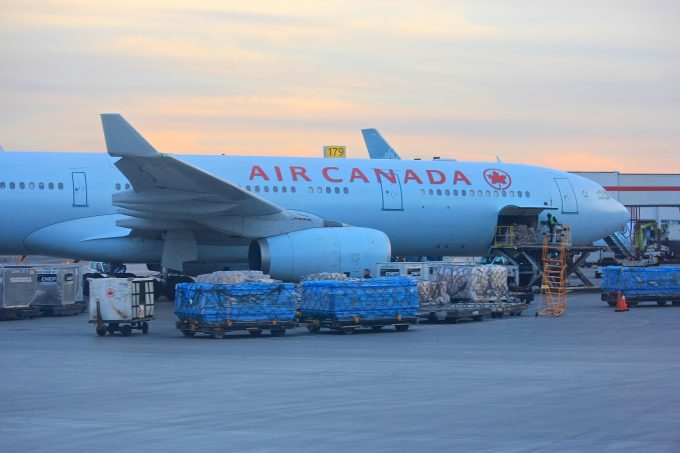Magma expands to Dubai with two freighters, as ASG keeps growing
Magma Aviation, the Avia Solutions Group-owned airline, has expanded with a new base and two ...
TFII: SOLID AS USUALMAERSK: WEAKENINGF: FALLING OFF A CLIFFAAPL: 'BOTTLENECK IN MAINLAND CHINA'AAPL: CHINA TRENDSDHL: GROWTH CAPEXR: ANOTHER SOLID DELIVERYMFT: HERE COMES THE FALLDSV: LOOK AT SCHENKER PERFORMANCEUPS: A WAVE OF DOWNGRADES DSV: BARGAIN BINKNX: EARNINGS OUTODFL: RISING AND FALLING AND THEN RISING
TFII: SOLID AS USUALMAERSK: WEAKENINGF: FALLING OFF A CLIFFAAPL: 'BOTTLENECK IN MAINLAND CHINA'AAPL: CHINA TRENDSDHL: GROWTH CAPEXR: ANOTHER SOLID DELIVERYMFT: HERE COMES THE FALLDSV: LOOK AT SCHENKER PERFORMANCEUPS: A WAVE OF DOWNGRADES DSV: BARGAIN BINKNX: EARNINGS OUTODFL: RISING AND FALLING AND THEN RISING

Air Canada’s foray into the world of freighters aims to offer forwarders an air cargo network, rather than specific origin and destination pairs, Lise-Marie Turpin, the carrier’s president cargo, has confirmed to The Loadstar.
Eight years after it bowed out of the main deck market, Air Canada Cargo (AC) is set to deploy freighters again.
While its previous all-cargo operations were directed at Europe and Asia, this time the focus is on Latin America – but a return to Europe is on the cards.
Under a commercial agreement with Cargojet, Canada’s largest freighter operator, AC will launch all-cargo flights from Toronto to Mexico, Colombia and Peru, using B767-300F aircraft provided by Cargojet. And in June, it will launch twice-weekly freighter services to Mexico City via Dallas/Fort Worth and a weekly run to Bogota and Lima, routed over Atlanta.
According to its executive vice president and chief commercial officer, Jamie Porteous, Cargojet will operate the flights on an ACMI basis, with AC looking after the marketing, handling and transfers, including road feeder services to and from AC’s largest gateway.
The freighters to Latin America fly out of Hamilton Airport, Cargojet’s base, which is less than 60km from Toronto – “seamless to our customers”, said Ms Turpin.
If all goes to plan, capacity on the new sectors will increase soon. Ms Turpin says the pair plan to ramp up frequencies to three weekly Mexico services and two flights a week to Peru and Colombia.
Response to the announcement of the new flights has been positive, she reports. Canadian forwarders have long bemoaned a lack of lift to Latin America. However, the aircraft will not be filled exclusively with Canadian cargo, Ms Turpin said.
“We’re looking at the globe, not just Canada,” she said. “This is what we move through our network.”
In addition AC can utilise fifth freedom rights in the US to top up on its Latin freighter flights, she confirmed.
Presumably AC’s network will play an even greater role if it and Cargojet proceed with plans to expand their cooperation with a transatlantic freighter operation later this year. According to Ms Turpin, this is currently under scrutiny, but no decisions have been made so far.
Air Canada used to run MD-11Fs to Frankfurt and points in Asia, but those were terminated in 2008 in response to escalating costs, notably fuel.
Ms Turpin acknowledges that the transatlantic market is tough. Another Canadian operator, KF Aerospace, terminated its all-cargo flights to Brussels after less than a year, citing an abundance of bellyhold lift between North America and Europe.
“We would be selling a network, not one freighter that serves a specific origin and destination pair,” she stressed, adding that a final decision on the viability of the operation and the likely route has yet to be made.
“We’re looking at it. It will be eyes wide open if we do it,” she said.
The two Canadian carriers have been talking of working together and taking advantage of synergies.
“We are both hopeful that we can grow this arrangement in the future,” said Mr Porteous.
For Cargojet the new AC routes promise better utilisation of its capacity. The company underwent a rapid fleet expansion over the past two years as it took on a long-term contract for overnight lift for Canada Post, which has given it a number of 767-300 freighters that are available in off hours for charter and ACMI work.
Under one ACMI deal it runs a weekly freighter between New York and Warsaw for LOT Polish Airlines.
Comment on this article